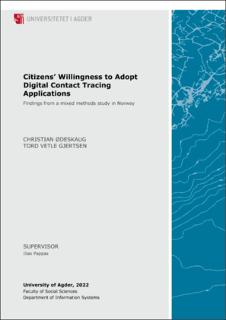Citizens' Willingness to Adopt Digital Contact Tracing Applications: Findings from a mixed methods study in Norway
Abstract
Context: Early 2020, the SARS-CoV-2 (COVID-19) pandemic began to spread globally.Digital contact tracing (DCT) applications began development soon after to help mitigate thespread and contain this major crisis. In Norway, the application Smittestopp was developed tofulfill the role as a digital solution. With a poor launch and little enforcement, less than halfof the population downloaded the application. This experience should be explored further bythe Norwegian government, in order to ensure successful digital solutions in the future.
Purpose: The purpose of this thesis is to explore Norwegians citizens’ willingness to adoptSmittestopp, and if privacy concerns and human emotions affected these intentions. The waywe measured this was by looking at how; 1) privacy concerns, risk beliefs, trusting beliefsand relative advantage impacts intention to use Smittestopp and 2) if human emotionsmoderate the effects of these relations, thus, impacting intention to use Smittestopp.
Methods: Our mixed methods research consisted of expanding an existing literature reviewand conducting a quantitative survey with a questionnaire. To complement the questionnairedata, follow-up interviews were also conducted. The literature review served as a theoreticalfoundation for our research, providing an overview of existing research on DCT-applications.A research model was adopted from a previous study examining Australian citizens'willingness to adopt the COVIDSafe-app. 9 hypotheses were developed to test suggestedconstruct relations. The questionnaire was developed in SurveyXact by adopting questionsfrom the aforementioned research paper, adjusting it for our research with the inclusion ofhuman emotions. We received 189 valid responses to the distributed questionnaire, and madean interview guide aiming to complement and verify these responses further. We performedinterviews with 11 volunteers from the questionnaire. The questionnaire data was analyzedusing partial least squares structural equation modeling (PLS-SEM) in SmartPLS. Theinterview transcripts were analyzed using Quirkos; a Computer-assisted Qualitative DataAnalysis Software (CAQDAS).
Results: All 9 hypotheses were validated and supported through an analysis of thequestionnaire data. These findings were later complemented by interview data, which verifiedmost of the hypotheses but also brought interesting and contradictory results. Most notably,relative advantage significantly increased intention to use. Also, privacy concerns increasedrisk beliefs, trusting beliefs decreased risk beliefs, and intention to use increased actual use.
Conclusion: We concluded that privacy concerns, trusting beliefs, risk beliefs and relativeadvantage affected citizens’ intentions to use DCT-applications. Emotions moderate bothrelative advantage and risk beliefs relations into intention to use. The findings explain whySmittestopp was barely used, and how future digital solutions can learn from this.
Keywords: Digital contact tracing, COVID-19, information privacy concerns, trusting andrisk beliefs, relative advantage, human emotions, Smittestopp, e-governance, mixed methods.
